2021 Carols and Candlelight
Digital Program
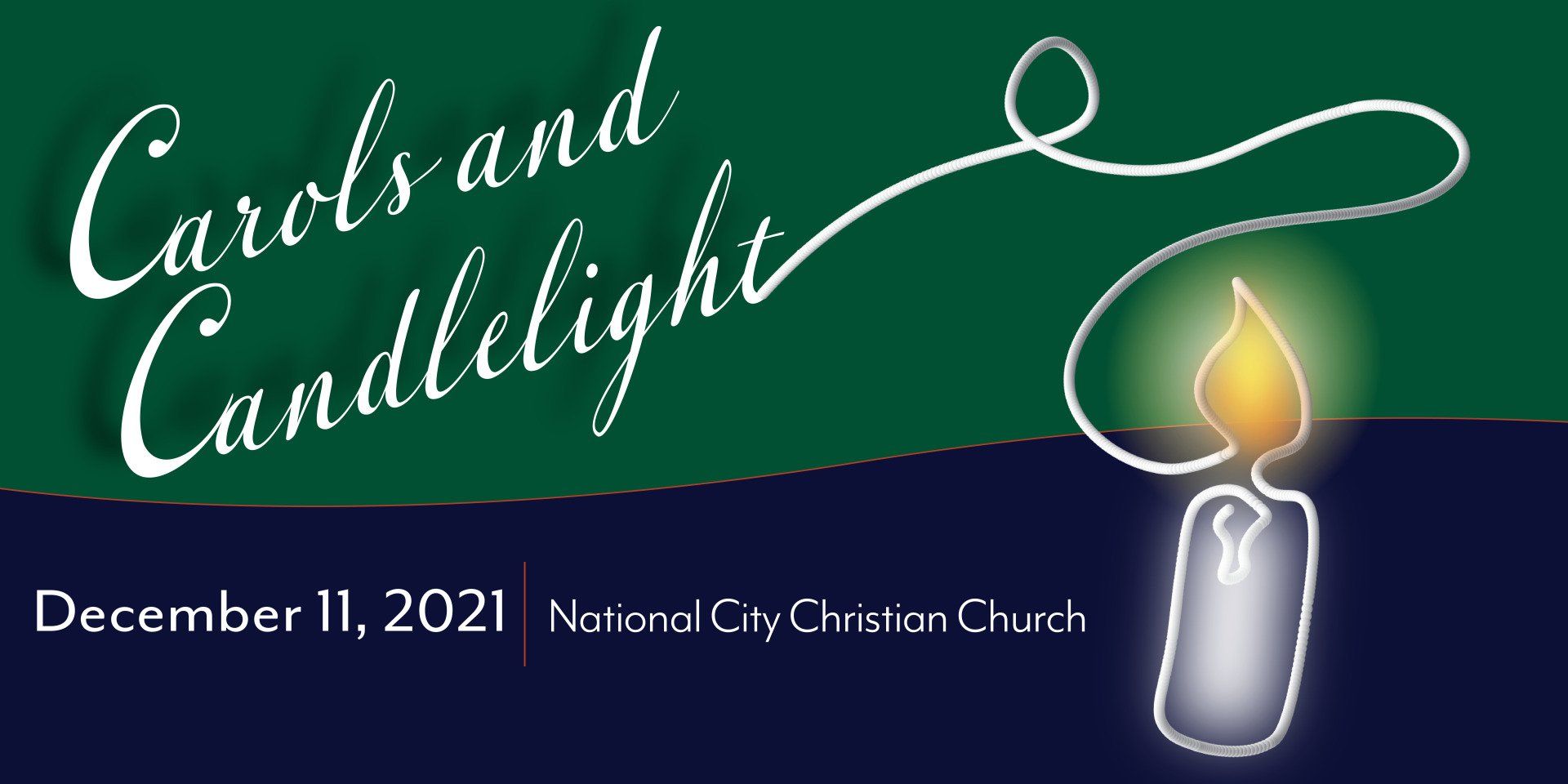
This performance is being recorded. You are welcome to take photos with no flash throughout the performance. You may use flash after the final bow. No video, please. If you post on social media about the event, please tag us! We're @childrenschorus on Instagram and @ChildrensChorusofWashington on Facebook.
View a PDF of the printed program here.
Lyrics, Translations, and Program Notes
I Saw Three Ships
Traditional English Carol, Arr. John Frederick Hudson
I saw three ships come sailing in On Christmas Day in the morning.
And what was in those ships all three, On Christmas Day in the morning?
Our Savior Christ and his lady, On Christmas Day in the morning.
Pray, wither sailed those ships all three, On Christmas Day in the morning.
O they sailed into Bethlehem, On Christmas Day in the morning.
And all the bells on earth shall ring, On Christmas Day in the morning.
And all the Angels in Heav'n shall sing, On Christmas Day in the morning.
And all the souls on earth shall sing, On Christmas Day in the morning.
Then let us all rejoice again, On Christmas Day in the morning.
I saw three ships come sailing in, On Christmas Day, on Christmas Day.
This familiar English carol was written in the 17th century by wandering minstrels as they traveled through the country. It was originally an English folk song traditionally known as “As I Sat on a Sunny Bank”. Since the nearest body of water to Bethlehem is the Dead Sea, twenty miles away. Some believe these “ships” are the camels that carried the Magi, known as camels are frequently referred to as “ ships of the desert”. John Frederick Hudson is a young American composer, conductor and pianist, living and working in the UK.
Dona Nobis Pacem (Grant Us Peace)
Dona nobis pacem.
Grant us peace.
This familiar text is arranged in a manner that is inspired by Britten and is presented antiphonally between three different choral groups. I was inspired by the fanfare nature of this piece and its celebration of vocal harmonies as separate parts and together. It seemed the perfect opener for our Carols and Candlelight concert and sets the tone for Britten’s A Ceremony of Carols.
Star Carol
Sing this night, for a boy is born in Bethlehem,
Christ our Lord in a lowly manger lies;
Bring your gifts, come and worship at his cradle,
Hurry to Bethlehem and see the son of Mary!
See his star shining bright In the sky this Christmas Night!
Follow me joyfully; Hurry to Bethlehem and see the son of Mary!
Angels bright, come from heaven's highest glory,
Bear the news with its message of good cheer:
"Sing, rejoice, for a King is come to save us,
Hurry to Bethlehem and see the son of Mary!"
See, he lies in his mother's tender keeping;
Jesus Christ in her loving arms asleep.
Shepherds poor, come to worship and adore him,
Offer their humble gifts before the son of Mary.
Let us all pay our homage at the manger,
Sing his praise on this joyful Christmas Night;
Christ is come, bringing promise of salvation;
Hurry to Bethlehem and see the son of Mary!
A holiday concert would not be complete without John Rutter’s Christmas carols. His settings of traditional carols and original compositions bring the holidays to life. “Christmas is still very dear in my heart,” Rutter says. “It’s kind of the world as we all wish it could be, for just those precious few days each year. A time of stillness and yet of rejoicing. So Christmas will always be very special in my heart and it’s always been celebrated in music.”
A Ceremony of Carols, Op. 28
Benjamin Britten (1913-1976), Text from The English Galaxy of Shorter Poems
This collection of short songs was written by Benjamin Britten while he was traveling on the long transatlantic boat ride returning from the US back to England. Along the way, the boat was forced to stop in Nova Scotia, Canada and Britten picked up a book of 15th century Medieval poems and was inspired to write A Ceremony of Carols. Having just completed four years working closely with Copland and influenced by opera, theater, film and social issues, Britten’s perspective of the Christmas story, combined with metaphysical poets like George Herbert and Southwell is presented from various perspectives, focusing on the fragility of the Virgin Mary, the Baby’s human trembling and the nativity as a fortress against and Satan. Britten’s unique interpretation of the Christmas story and his virtuous compositional style is a testament to why this piece remains one of the choral masterpieces of Christmas music for treble voices.
Procession
Hodie Christus natus est: hodie Salvator apparuit:
hodie in terra canunt angeli laetantur archangeli:
hodie exsultant justi dicentes gloria in excelsis Deo.
Alleluia! Alleluia! Alleluia!
Wolcum Yole!
Wolcum be thou hevenè king, Wolcum Yole!
Wolcom, born in one morning, Wolcum for whom we sall sing!
Wolcum, Thomas marter one, Wolcum, seintes lefe and dere,
Wolcum Yole, Wolcum Yole, Wolcum!
Candelmesse, Quene of bliss, Wolcum bothe to more and lesse.
Wolcum be ye that are here, Wolcum Yole, Wolcum alle and make good cheer.
Wolcum alle another yere, Wolcum Yole, Wolcum!
There is no Rose
There is no rose of such vertu As is the rose that bare Jesu.
Alleluia, Alleluia,
For in this rose conteinèd was Heaven and earth in litel space,
Res miranda, res miranda.
By that rose we may well see There be one God in persons three,
Pares forma, pares forma.
The aungels sungen the shephers to: Gloria in excelsis, gloria in excelsis Deo!
Gaudeamus, Gaudeamus,
Leave we all this werldly mirth, and follow we this joyful birth.
Transeamus, Transeamus, Transeamus,
Alleluia, Res miranda, Pres forma, Gaudeasmus, Transeamus.
That yongë child
That yongë child when it gan weep With song she lulled him asleep:
That was so sweet a melody It passèd alle minstrelsy.
The nightingalë sang also: Her song is hoarse and nought thereto:
Whoso attendeth to her song And leaveth the first then doth he wrong.
Balulalow
O my deare hert, young Jesu sweit,
Prepare they creddil in my spreit,
And I sall rock thee to my hert,
And never mair from thee depart.
But I sall praise thee evermoir
With sanges sweit unto they gloir;
The knees of my hert sall I bow, sall I bow,
And sing that richt Balulalow!
As dew in Aprille
I sing of a maiden That is makèles:
King of all kings To her son she ches.
He came also stille There his moder was,
As dew in Aprille That falleth on the grass.
He came also stille To his moder's bour,
As dew in Aprille That falleth on the flour.
He came also stille There his moder lay,
As dew in Aprille That falleth on the spray.
Moder and mayden was never none but she:
Well may such a lady Goddes moder be.
This little Babe
This little Babe so few days old, Is come to rifle Satan's fold;
All hell doth at his presence quake, Though he himself for cold do shake;
For in this weak in unarmèd wise The gates of hell he will surprise.
With tears he fights and wins the field, His naked breast stands for a shield;
His battering shot are babish cries, His arrows looks of weeping eyes,
His martial ensigns Cold and Need, And feeble Flesh his warrior's steed.
His camp is pitchèd in a stall, His bulwark but a broken wall;
The crib his trench, haystalks his stakes; Of shepherds he his muster makes;
And thus, as sure his foe to wound, The angels' trumps alarum sound.
My soul, with Christ join thou in fight; Stick to the tents that he hath pight.
Within his crib is surest ward; This little Babe will be thy guard.
If thou wilt foil thy foes with joy, then flit not from this heavenly Boy.
Spring Carol
Pleasure it is to hear iwis, the Birdès sing,
The deer in the dale, the sheep in the vale, the corn springing
God's purvayance For sustenance. It is for man. It is for man.
Then we always to him give praise, And thank him than.
This movement is performed by the Concert Chorus seniors of the Class of 2022: Caroline Grant, Amelia Lashway, Carmen Lopez Fernandez, Marley Schwarz, and Margaret Taylor
Deo Gracias
Deo gracias! Deo gracias!
Adam lay ibounden, bounden in a bond;
For thousand winter thought he not to long.
Deo gracias! Deo gracias!
And all was for an appil, an appil that he tok,
As clerkès finden written in their book.
Deo gracias! Deo gracias!
Ne had the appil takè ben, The appil takè ben,
Ne haddè never our lady A ben hevenè quene.
Blessèd be the time That appil takè was.
Therefore we moun singen, we moun singen.
Deo gracias! Deo gracias!
Recession
Hodie Christus natus est: hodie Salvator apparuit:
hodie in terra canunt angeli laetantur archangeli:
hodie exsultant justi dicentes gloria in excelsis Deo.
Alleluia! Alleluia! Alleluia!
Allundé Alluya
West African Prayer Lullaby, Arr. Salli Terri, Instrumentation by Margaret Campbelle-Holman
Allundé, Allundé, Allundé, Alluya!
Zjaypoowah, yay. Yay koosaw. Aiyaiyaiyay, Allunde.
Mahnday ahkwakwa, ahkwakwa mahnday! Aiyaiyaiyay Allunde.
O God of the sunrise, protect this child. Help the infant to grow and become a worthy member of our tribe.
This song and melody has taken on several different forms as it has been passed along between many West African tribes. It is the same melody as the Nigerian New Year song, Odunde, which was introduced by Nigerian drummer Babatunde Olatunji. The song is sung in Swahili and is a prayer song for the Sun. In many tribes, the sun is the source of wisdom and is the bestower of light and life. Our attempts at learning the true source of this song produced mixed answers and is regarded by different countries as their own.
Lux Aeterna from Missa (Light Eternal)
Z. Randall Stroope (b. 1953)
Lux aeterna luce at eis. Domine
Cum sanctis tuis: quia pius es.
Lux perpetua luce at eis
Requiem aeterna dona eis
Lux, lux, lux
Eternal Light - May eternal light shine on them, Lord.
With you saints forever, for you are good.
May light perpetual shine upon them for you are good.
Give them eternal rest
Light, light, light
"Lux Aeterna" was written for the American Boychoir and has become a staple in the treble choir repertoire. Randall’s beautiful vocal lines capture the purity and clarity of the text and has challenged the singers to work closely on listening and singing as one voice.
Ad Astra (To the Stars….)
Jacob Narverud (b. 1986)
Ad astra per aspera
to the stars ...
Sursum
When you’re tired and troubled and you have lost your way,
Don’t let hard times lead you astray.
Though you may be weary, just know you’re not alone,
for the stars will guide you home.
Movere, deinceps, sine cura, post omnes.
Move forward, look upward, leave all cares behind.
Ad Astra per aspera
to the stars ... to the stars!
This piece uses the Latin phrase “Ad astra per aspera” which translates to ”... to the stars with difficulties” and is the state motto of Kansas, the composer’s origins. The wonderful driving momentum of this piece inspires one to continue to move past your troubles and look forward and upward to the stars to guide you to better things ahead.
Nella Fantasia
Ennio Morricone (b. 1928-2020), Lyrics by Chiara Ferrau
Nella Fantasia io vedo un mondo giusto,
Li tutti vivo no in pace in onestà.
Io sogno d’anime che sono sempre libere,
Come le nuvole, che volano,
Pien’ d’umanità in fondo al l’anima.
Nella fantasia io vedo un mondo chiaro,
Li anche la notte è meno oscura.
Nella fantasia esiste un vento caldo,
Che soffia sulle città, come amico.
In my imagination I see a just world
Where all live in peace and honesty.
I dream of souls that are always free
Like clouds that soar
Full of humanity; deep in spirit.
In my imagination I see a bright world.
There even night is less dark.
In my imagination there is a warm wind
That breathes over the cities, like a friend.
This song was originally written as an instrumental soundtrack to the film The Mission and is known as Gabriel’s Oboe. Apparently, Sarah Brightman loved this melody so much that she begged Morricone to have this adapted for voice and wrote the words. Chiara Ferrau then translated it to Italian. The text and message is universal and one that we can all aspire to fulfill.
Go Where I Send Thee
Gospel Spiritual, Arr. Paul Caldwell and Sean Ivory
Children go where I send thee!
How shall, how shall I send thee?
I'm gonna send thee one by one,
one for the little bitty baby,
the baby boy born in Bethlehem.
I'm gonna send thee two by two,
two for Paul and Silas, ...
I'm gonna send thee six by six, six for the days when the world was fixed,
five for the bread they did divide,
four for the Gospel writers,
three for the Hebrew children, ...
I'm gonna send thee twelve by twelve,
twelve for the twelve disciples,
'leven of 'em singin' in heavenm
ten for the ten commandments,
nine for the angel choirs divinem
eight for the eight the flood couldn't take,
seven for the day God laid down his head, ...
Children go where I send thee!
This is a popular gospel arrangement of a spiritual from the African-American folk tradition. It is a favorite among youth choirs and has been sung since 1995. Paul Caldwell and Sean Ivory began arranging music together spontaneously in the early 1990s. Caldwell and Ivory works (including
Go Where I Send Thee, Hope for Resolution,
and
Ain’t No Grave Can Hold My Body Down)
have become staples in the repertoire of many of the world’s finest ensembles.
Night of Silence
Cold are the people, Winter of life,
We tremble in shadows this cold endless night,
Frozen in the snow lie roses sleeping,
Flowers that will echo the sunrise,
Fire of hope is our only warmth.
Weary, its flame will be dying soon.
Voice in the distance, Call in the night,
On wind you enfold us You speak of the light,
Gentle on the ear you whisper softly,
Rumors of a dawn so embracing,
Breathless love awaits darkened souls,
Soon will we know of the morning.
Spirit among us, Shine like the star,
Your light that guides shepherds and kings from afar,
Shimmer in the sky so empty, lonely,
Rising in the warmth of the Son’s love,
Star unknowing of night and day,
Spirit we wait for the loving Son.
Please join in singing at the conductor's cue:
Silent night
Holy night
All is calm
All is bright
Round yon virgin
Mother and child
Holy infant
So tender and mild
Sleep in heavenly peace
Sleep in heavenly peace
This simple piece has a wonderful history that represents the emotional/spiritual journey experienced by Daniel Kantor as a young college student at St. Thomas University and has become a life lesson shared to all during this advent season.
Composing Night of Silence was a healing, integrative act for me. It leveraged both intellect and emotions in a way that validated the choices I'd made up to that point in my life, reconnecting me to the joy of creating music.
– Daniel Kantor
We are all pilgrims on a journey and sometimes we find ourselves in places we'd rather not be. It is through ritual that our journeys may be deepened and enriched. We live from one season to the next, through cyclical traditions that help us mark time, that ground us to the familiar while connecting us to our past and to those with whom we share our pilgrimage. When I composed Night of Silence I cleared a space for what now feels like a fountain that never runs dry. I continue to be filled by connections with amazing people, and the blessings of new and surprising experiences. That is the power of Advent. It first calls us to a spiritual presence grounded in quiet emptiness and expectant hope, and then asks us to trust in this silence. Night of Silence is my expression of this. Beginning in the darkness it guides us to that moment when dawn breaks and a morning of endless possibility awaits.
– Daniel Kantor
Quest of the Kings
John Henry Hopkins, Arr. Jacob Narverud
We three kings of Orient are bearing gifts, we traverse afar.
Field and fountain, moor and mountain, following yonder star.
Born a king on Bethlehem's plain, gold I bring to crown him again.
King forever, ceasing never, over us all to reign.
Oh, star of wonder, star of night, star with royal beauty bright,
westward leading, still proceeding, guide us to thy perfect light.
Frankincense to offer have I, incense owns a deity nigh;
pray'r and praising, all men raising, worship him, God on high.
Glorious now behold him arise, King and God of sacrifice.
Alleluia, Alleluia, sounds through the Earth and skies!
Quest of the Kings
(originally titled
We Three Kings,
Three Kings of Orient, and
Quest of the Magi) is a traditional carol written by Pennsylvania native Reverend John Henry Hopkins, Jr. (1820-1891). Hopkins was an author, book illustrator, stained glass window designer, minister, and editor for the
New York Church Journal. Hopkins wrote this particular carol for a Christmas pageant put on by his nieces and nephews in the General Theological Seminary of New York City in 1857. In 1863, during the midst of the Civil War, Hopkins published this carol in his book
Carols, Hymns and Songs,
in hopes of spreading holiday joy to those suffering during the difficult times.
Hine Ma Tov
Hebrew Folk Songs, Arr. Lon Berry
Hine ma tov uma nayim, shevet achim gam yachad.
Behold how good and how pleasing / for brothers (people) to sit together in unity.
Two popular Jewish folk song settings of Psalm 133:1 are creatively joined here in this medley. One English translation reads: “How very good and pleasant it is when kindred live together in unity!” The text is traditionally sung at Shabbat feasts.
Stars I Shall Find
Victor C. Johnson,(b. 1978) Text by Sara Teasdale
There will be rest, and sure stars shining over the rooftops crowned with snow,
a reign of rest, serene forgetting, the music of stillness holy and low.
I will make this world of my devising, out of a dream in my lonely mind,
I shall find the crystal of peace, above me, stars I shall find.
This masterful setting of a poem by Sara Teasdale (1884-1933) sparkles with wonderful musical clarity, purity of form, and musical quality. Although Teasdale’s style was traditional, she seemed to many as a spokesperson for her generation. She also had a gift for friendship. She formed strong and lasting friendships with some of the most interesting writers of her generation that include John Wheelock, Amy Lowell, Joyce Kilmer, and Vachel Lindsay.
Hallelujah for the Day
Andrea Ramsey, Words adapted from a Traditional Fisherman’s Prayer in Ghana
Hallelujah for the day! And blessing for the night.
The nets are filled, we have drawn them in, we have sung Your praise.
What a blessing is the seas with fish in plenty.
Lord, that is the story of Your grace.
The nets tear, we cannot hold them all.
O Lord, we sing Your praise!
Hallelujah for the day! And blessing for the night.
Lord, with Your praise, we drop off to sleep.
Carry us through the night.
Make us fresh for the morning, O Lord, our God.
Hallelujah for the day!
The text for
Hallelujah for the Day!
is selected from a larger traditional Ghanian fisherman’s prayer. Within the text can also be seen the influence of symbolic Christian ideas and language. The unabridged prayer reads:
Lord, I sing your praise
The whole night through until the night.
Dad’s nets are filled. I have helped him.
We have drawn them in, stamping the rhythm with our feet,
The muscles tense.
We have sung your praise.
On the beach there were our mothers,
Who bought the blessings out of the nets,
Out of the nets and into their basins.
They rushed to market, returned and bought again.
White Winter Hymnal
Robin Pecknold (b. 1986), Arr. Alan Billingsley
I was following the pack, all swallowed in their coats,
with scarves of red tied round their throats
to keep their little heads from falling in the snow.
And I turned round and there you go,
and Michael, you would fall and turn the white snow
red as strawberries in the summertime.
Robin Pecknold, the leader of the Seattle-based American indie folk band Fleet Foxes, first recorded "White Winter Hymnal" in 2008 and this piece became widely known when Pentatonix released their
a cappella rendition in 2014. Pecknold represents a current artist that struggled during the pandemic and channeled the psychological stress into his songwriting. “The whole experience gave me so much additional perspective on what community means, what death means, what gratitude means, what privilege is,” he says.
Where the Light Begins
Susan LaBarr (b. 1981), Text by Jan Richardson
Perhaps it does not begin.
Perhaps it is always.
Perhaps it takes a lifetime to open our eyes,
to learn to see the luminous line of the map in the dark,
the vigil flame in the house of the heart,
the love so searing we can't keep from singing, from crying out.
Perhaps this day the light begins,
We are where the light begins.
Perhaps it does not begin.
Perhaps it is always.
This beautiful poem was originally written as a blessing for Christmas by writer Jan Richardson. On her blog, she writes “May we lean into the light that begins in the deepest dark, bearing itself into this world for us.” Jan’s blessing makes me think that within each of us is the ability to work toward peace.
When we love, accept, and care for all of our neighbors - despite our differences - we find that the light that the dark world so desperately needs begins in us. - Susan LaBarr
Natalie Hemby, Lori McKenna, and Brandi Carlile, Arr. Andrea Ramsey
You can hold my hand when you need to let go.
I can be a mountain when you're feeling valley low.
I can be a streetlight showing you the way home,
if you can hold my hand when you need to let go.
I want a house with a crowded table,
and a place by the fire for ev'ryone.
Let us take on the world while we're young and able,
and bring us back together when the day is done.
If we want a garden, we're gonna have to sow the seed,
plant a little happiness, let the roots run deep.
If it's love that we give, then it's love that we reap.
If we want a garden, we're gonna have to sow the seeds.
The door is always open, your picture's on my wall,
Ev'ryone's a little broken, and ev'ryone belongs.
This song written in 2019 during the pandemic won the Grammy award for the Best Country song in 2021. The song is a call for inclusivity, working together and acceptance even among our differences, in the workplace, at home and with friends. Carlisle explains her concept for this song - "going out into the world and being an activist and furthering agendas that I think will make the world a better place, but still being able to come home at the end of the day and be in my family and be with people that do not agree with me so that we can all move a little bit closer to the middle of the road."
Abreme La Puerta
Traditional from Puerto Rico, Arr. Cristian Grases
Ábreme la puerta que estoy en la calle, y dirá la gente que esto es un desaire, si!
A la zarandela de mi corazón.
Allá adentro veo, un bulto tapao no sé si será un lechón asao no sé si será.
Open the door for me.
I can see that there’s something hidden inside.
Could it be roasted pork?
This is a secular Christmas carol and is based on a Puerto Rican tradition. The songs known as aguinaldos are performed by groups of singers throughout the month of December with the sole intention of waking up the owners of a house to receive food and drinks from them. The owners are supposed to invite them into their home, eat and drink with them and hopefully join the group as they head to the next home; all this in the spirit of celebrating Christmas.
O Come, All Ye Faithful
Arr. David Willcocks
The audience is invited to join the Chorus on stage during this song to be in place for the “Hallelujah Chorus” sing-a-long.
O Come, all ye faithful,
Joyful and triumphant,
O come ye, O come ye to Bethlehem
Come and behold him
Born the King of Angels:
O come, let us adore him (x3)
Christ the Lord!
Sing, choirs of angels,
Sing in exultation,
Sing, all ye citizens of heav'n above;
Glory in the highest:
O come, let us adore him (x3)
Christ the Lord!
Hallelujah Chorus from Messiah
George Frideric Handel
Hallelujah: for the Lord God omnipotent reigneth, Hallelujah.
The kingdom of this world is become the kingdom of our Lord and of his Christ;
and he shall reign for every and ever.
King of Kings and Lord of Lords, Hallelujah!
The “Hallelujah” chorus remains a predominant chorus that many view as a staple of the Christmas repertoire. It is a work so strongly tied to Christmas that many are unaware that it was originally intended for performance during the Easter season. In fact, this work was not intended to be performed in a religious service and was written as an entertaining alternative to opera. It is still customary to stand during the “Hallelujah” chorus, a tradition that began before 1780 and is popularly attributed to King George II who reputedly stood during the chorus at a London performance.
Al Shlosha D’Varim
Allan E. Naplan, Text from Pirkei Avot (Mishnah)
CCW Alumni in the audience are invited to join the Chorus on stage.
Al shlosha d’varim haolam kayam, Al haemet v’al hadin v’al hashalom.
The world is sustained by three things, by truth, by justice, and by peace.
This piece has become CCW’s anthem and is known by all of our choristers, new and old. At our 25th Anniversary celebration, June 2021, we were honored to share stories and our longtime relationship with composer Allan Naplan.
I Wish You Christmas
John Rutter
I wish you starlight on fields of snow,
The winter's morning light and evening's glow;
I wish you candles that shine from ev'ry tree,
So all the world can see the light that there could be.
I wish you music, I wish you song,
With voices echoing, joyous and strong;
I wish you church bells, ringing true and clear;
I wish you Christmas, a merry Christmas,
A merry Christmas to remember all the year.
Old friends smiling, thinking of times gone by;
Young friends laughing: Christmas is here,
Spirits are bright, and hopes are high.
I wish you loved ones around your fire;
May Christmas bring you all your heart's desire.
I wish you children to make the season new,
With dreams you help come true,
Just like it was for you.
I wish you blessings, I wish you love,
The sound of angel choirs from high above;
I wish you laughter, happiness and cheer:
I wish you Christmas, a merry Christmas,
And may its joy and peace be with you through the year.
I wish you music, I wish you song;
I wish you harmony your whole life long;
The warmth of memories that long remain:
I wish you Christmas, a merry Christmas,
And may God bless you till we all shall meet again.
Rather than end our concert with a popular holiday song, this song seemed to represent the exact sentiment of gratitude for our ability to sing together and to not take for granted the ability to share this time of year with our friends and family in person. Rutter's song perfectly expresses this holiday feeling.
Artist Bios
Cristian Perez is an Argentine-American guitarist currently based in Northern Virginia. Defying all genres, Cristian weaves together genres from throughout the world to reveal the universality of music. With a strong foundation in classical, jazz and South American music, he crafts a singular voice, rich in sensitivity and nuance, that freely explores the possibilities of music as an art form. His debut album “Anima Mundi” has received numerous reviews throughout the world (Italy, Australia, Russia, Germany, Bolivia, South Korea, etc.), and reached #13 in the CMJ World Music charts in the USA. Former Artist in Residence at Strathmore Music Center, Cristian has been featured on Vintage Guitar Magazine. His music has taken him to China, Canada, Dominican Republic, Bulgaria, South Korea, Bolivia, and he continues to be in high demand with a busy performing schedule. Cristian is a Kremona Guitars Artist.
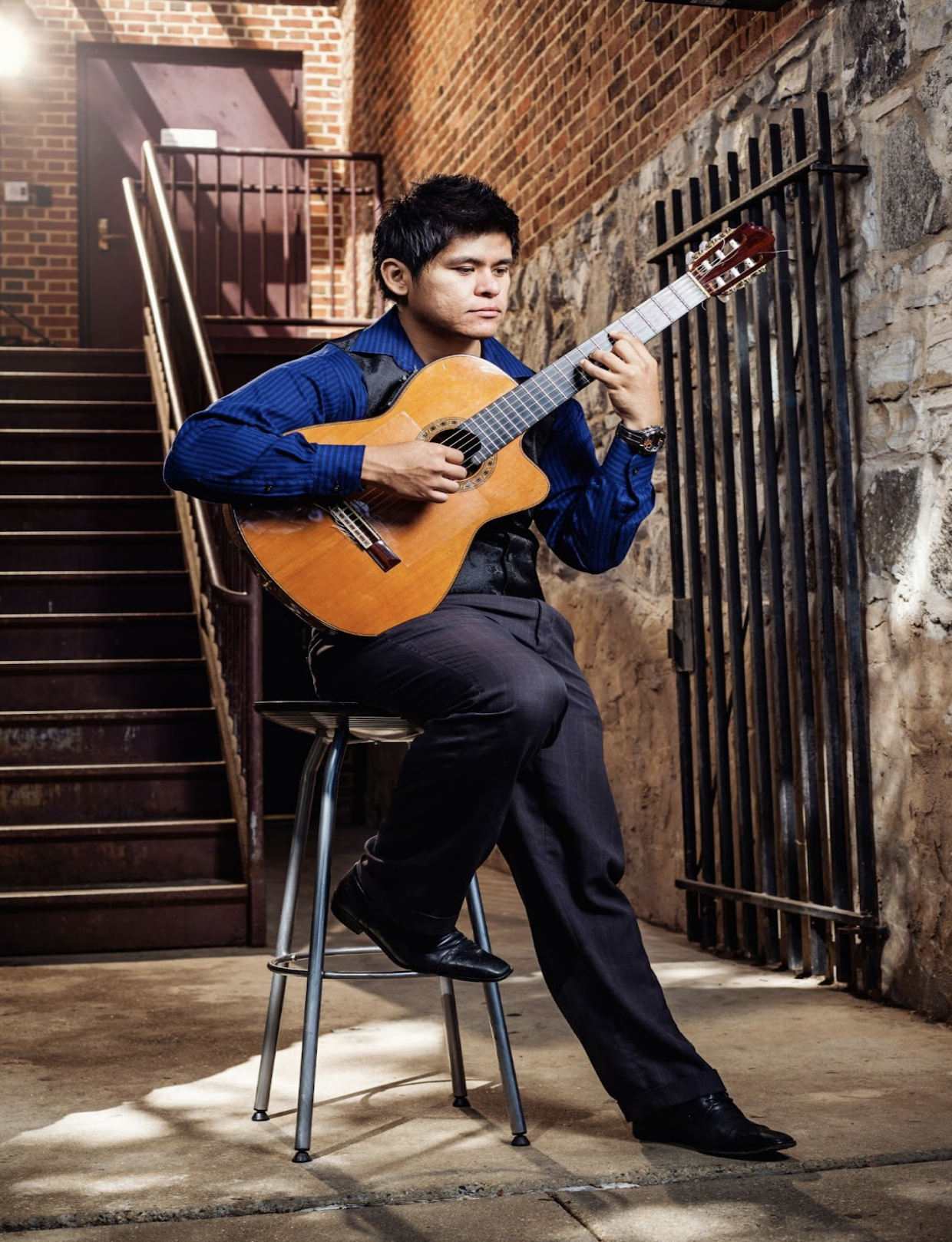
Sticks+Bars Youth Marimba Ensemble is DC's first and only African style marimba ensemble. Founded and directed by DCPS music teacher Premila Mistry, Sticks+Bars is a performance based ensemble, and provides the opportunity for students in grades 5-12 to play marimbas and percussion from across a wide span of genres and cultures and perform at various venues in and around Washington, DC, and beyond. Sticks+Bars has performed at the Kennedy Center, the Wharf, Arena Stage, Strathmore Hall in Bethesda, MD, Ithaca College in Ithaca, NY, and at the American Orff Schulwerk Professional Development Conference in Atlantic City, NJ.. New members are welcome to join anytime.
Please see our website: Sticks + Bars for more information.
Sticks+Bars Performers
Ian Bailey, Julius Boxer-Cooper, Daphne Frick, Noah Frick, Henry Pietras, Zachary Rau, and Briahna Tyree
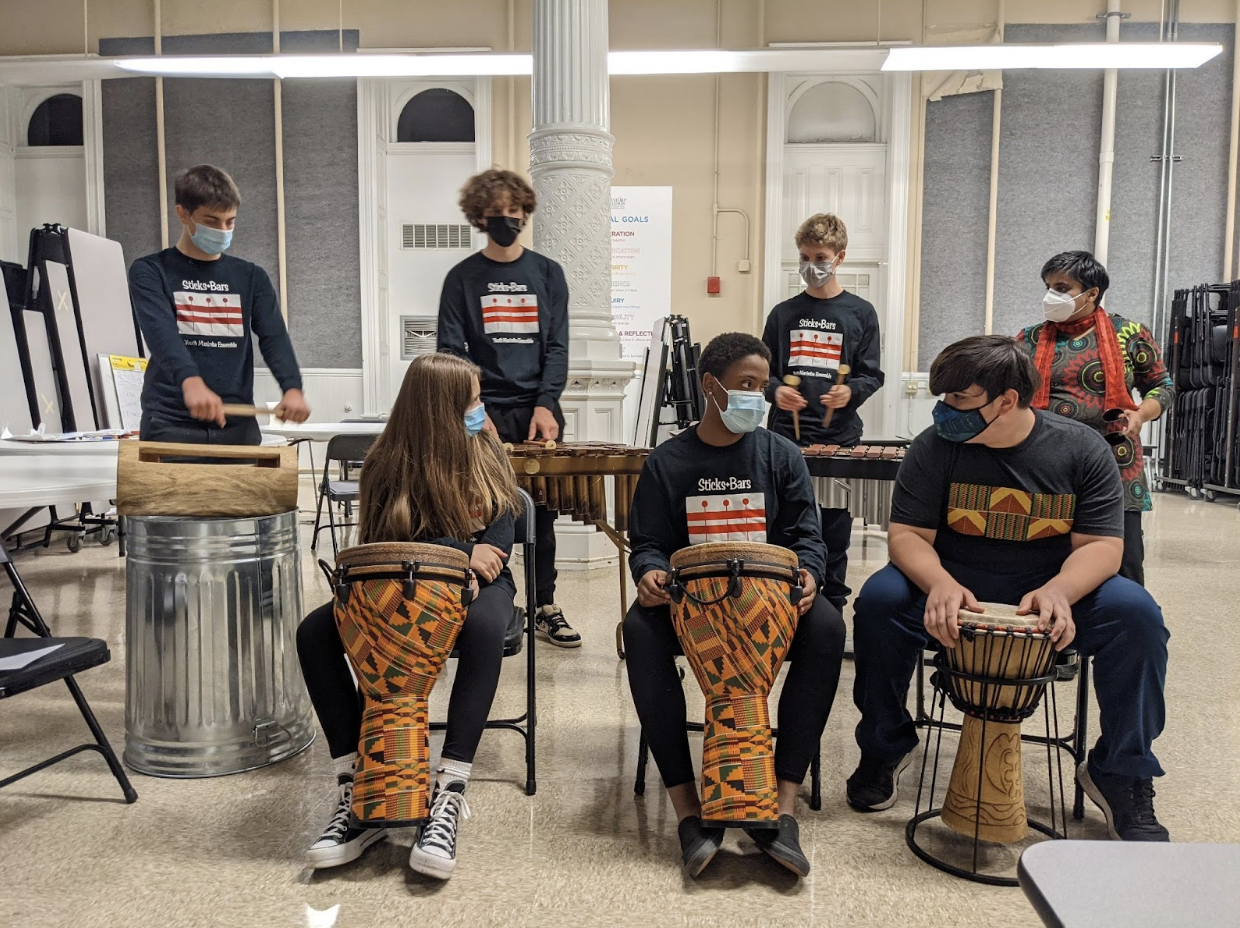
Nadia Pessoa is an award-winning harpist who has performed throughout the U.S., Europe, Brazil, and China. An active member of D.C.’s musical community, she has performed with the The Washington Ballet, Alexandria Symphony, Annapolis Symphony, Richmond Symphony, the Choral Arts Society of Washington, the Children’s Chorus of Washington, the National Symphony Orchestra, the Kennedy Center Opera House Orchestra, The American Pops, Christmas at the Washington National Cathedral, and for theater productions with Urban Arias, Signature Theatre, and Arena Stage.
She is the recipient of awards from the National Society of Arts and Letters and the American Harp Society, and has performed at Carnegie Hall and at Beijing’s National Center for the Performing Arts, and as a soloist at Avery Fisher Hall.
Since 2006, Nadia has served as the harpist for The United States Army Band “Pershing’s Own.” She can be heard on a number of recordings, including Leonard Slatkin’s GRAMMY award-winning recording of William Bolcom’s Songs of Innocence and Experience. She is a graduate of Indiana University and the University of Michigan.
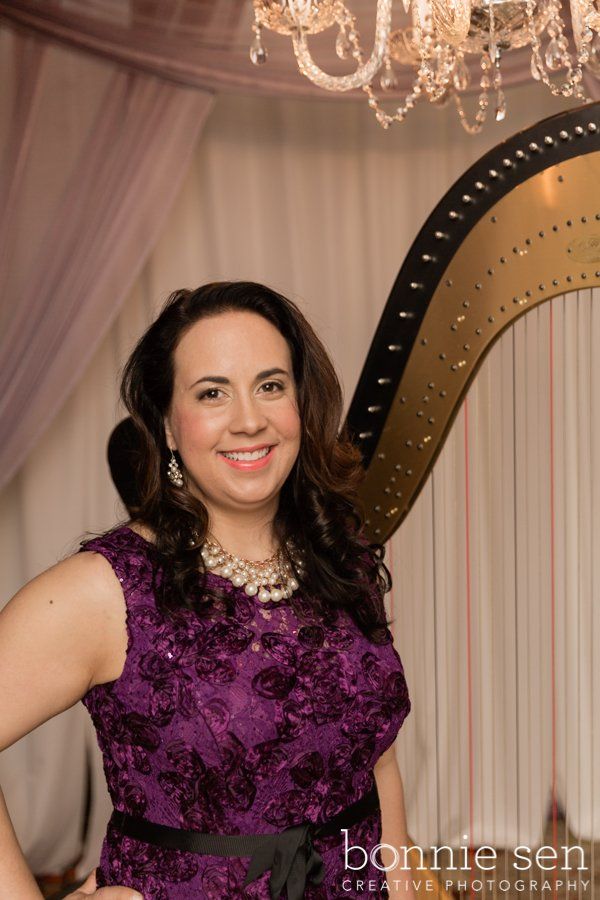
Alexandria Symphony Orchestra
Violins: Claudia Chudacoff, Meredith Riley
Viola: Jerome Gordon
Cello: Evelyn Elsing
Bass: Alan Stewart
Flute: Sara Stern
Oboe: Mark Christianson
Horn: Hark Huges
Trumpet: Chris Royal
Musical home for many of the musicians in tonight’s concert, Alexandria Symphony Orchestra (ASO) has served the greater Washington, D.C. region for more than 75 years. It presents a classical concert series and underwrites ASO Sympatico, an El Sistema-inspired music education program in the Alexandria City Public Schools. ASO also presents a free outdoor pops concert at the annual Alexandria Birthday Celebration each July and offers chamber concerts, recitals and small ensembles in the community throughout the year. Through its concerts and events with community engagement, ASO strives to provide quality, affordable and accessible music serving more than 10,000 people annually.
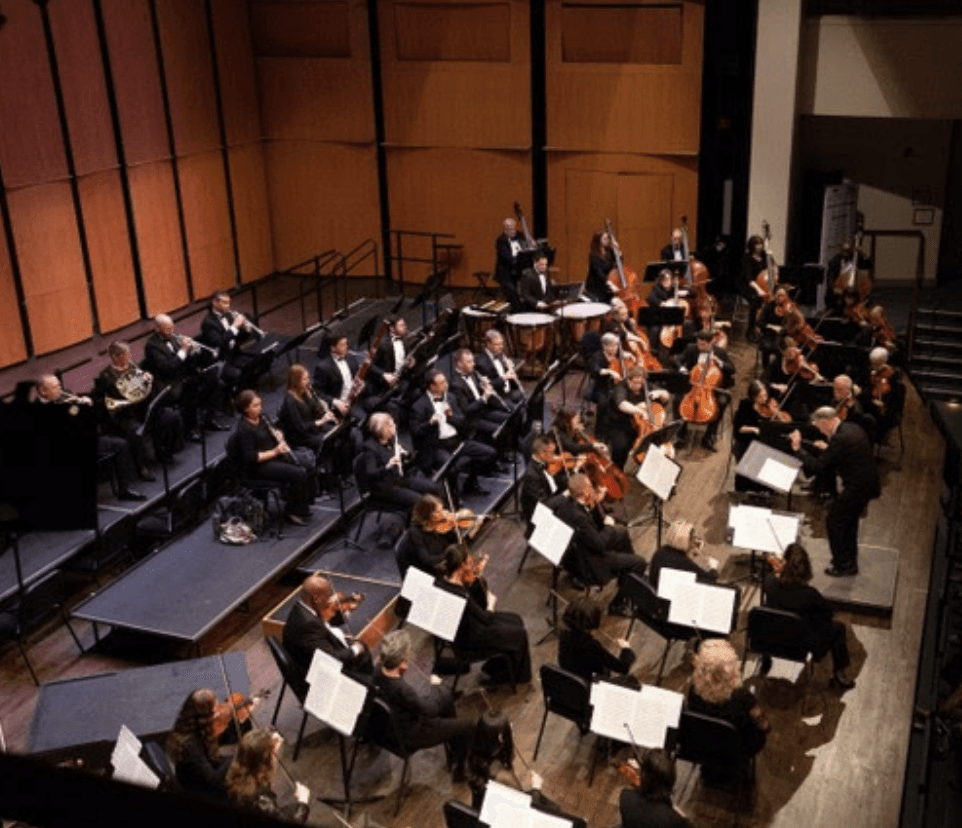
Howard University student Madison Greene designed our program, including the cover image.
Art Statement:
For this cover I wanted the theme of “journey” to be conveyed through movement. The free flowing line moves around to make the whimsical shape of a candle, which plays off of the title of the program. The darker blue, green, and red contrast the bright candle making it stand out more. A scripted typeface was chosen to pair with the flow of the art work.
Learn more at https://www.madisongreene.net/.


